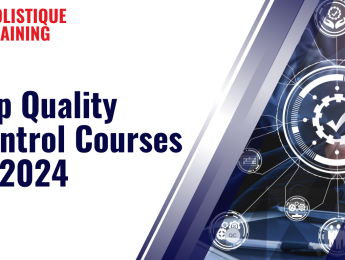- Table of Contents
- Introduction
- Certified Manager of Quality/Organizational Excellence (CMQ/OE) by ASQ
- Six Sigma Green Belt Specialization
- Introduction to Quality Control
- Certified Manager Of Quality/Organizational Excellence Certification Preparation
- Comprehensive Quality Control and Assurance at Holistique Training
Introduction
Quality control is an essential aspect of modern industry and business, ensuring that products and services meet specific standards of quality and reliability. It involves systematic processes for monitoring and managing quality, preventing defects, and improving operational efficiency. Effective quality control leads to increased customer satisfaction, reduced costs, and enhanced brand reputation. As markets become more competitive and customer expectations rise, the role of quality control becomes increasingly critical. Learning quality control principles and practices equips professionals with the skills needed to implement and maintain high standards, fostering continuous improvement and innovation. By mastering quality control techniques, individuals and organizations can achieve excellence, minimize risks, and stay ahead in a fast-paced global market.
Certified Manager of Quality/Organizational Excellence (CMQ/OE) by ASQ
Summary: This course prepares participants for the CMQ/OE certification exam, covering leadership, strategic planning, quality management tools, and customer-focused organizations. It also addresses new topics like virtual remote teamwork, machine learning, and cloud computing.
- Duration: 25 hours
- Language: English
- Level: Intermediate to Advanced
What does a Certified Manager of Quality/Organizational Excellence (CMQ/OE) course teach you?
A CMQ/OE course teaches you leadership principles, strategic planning, quality management tools, and techniques for building customer-focused organizations. It also covers modern topics such as virtual remote teamwork, machine learning, and cloud computing.
Who should take a CMQ/OE course?
This course is ideal for quality managers, team leaders, process improvement specialists, and professionals aiming to lead organizational excellence initiatives and prepare for the ASQ CMQ/OE certification exam.
Why should you take a CMQ/OE course?
Taking this course can enhance your leadership and quality management skills, equip you with tools to drive continuous improvement, and boost your career prospects in quality-focused leadership roles.
Six Sigma Green Belt Specialization
Institution: University System of Georgia (Coursera)
Summary: This course covers the Six Sigma methodology and its application in quality improvement. It includes topics like data analysis, process analysis, and statistical tests.
Duration: 3-6 months
Language: English
Level: Intermediate
What does a Six Sigma Green Belt Specialization Course teach you?
A Six Sigma Green Belt Specialization course teaches you the principles and methodologies of Six Sigma, focusing on process improvement, data analysis, statistical tests, and project management to improve business processes.
Who should take Six Sigma Green Belt Specialization course?
This course is ideal for professionals in quality management, process improvement roles, project managers, and those seeking to implement Six Sigma methodologies in their organizations.
Why should you take a Six Sigma Green Belt Specialization course?
Taking this course can help you enhance your problem-solving skills, increase efficiency in business processes, and make data-driven decisions, leading to improved quality and reduced operational costs.
Introduction to Quality Control
Institution: Alison
Summary: This course provides an introduction to quality control, covering its dimensions, components, and different control charts. It also includes work studies to understand process capability and process mean.
Duration: Self-paced
Language: English
Level: Beginner
What does an Introduction to Quality Control Course teach you?
An Introduction to Quality Control course covers the fundamentals of quality control, including the dimensions of quality, components of a quality control system, and various types of control charts and process capability studies.
Who should take Introduction to Quality Control course?
This course is suited for beginners in quality management, production supervisors, manufacturing staff, and anyone looking to understand the basics of quality control.
Why should you take an Introduction to Quality Control course?
Taking this course provides a solid foundation in quality control principles, helping you ensure that products meet specified quality standards and improve overall efficiency in manufacturing processes.
Certified Manager Of Quality/Organizational Excellence Certification Preparation
Institution: American Society for Quality (ASQ)
Summary: This course prepares students for the Certified Manager Of Quality/Organizational Excellence exam, covering leadership, strategic planning, quality management, and supply chain management.
Duration: Approximately 25 hours
Language: English
Level: Advanced
What does a Certified Manager Of Quality/Organizational Excellence Certification Preparation Course teach you?
This course prepares you for the CMQ/OE certification exam by covering leadership principles, strategic planning, quality management tools, and supply chain management.
Who should take Certified Manager Of Quality/Organizational Excellence Certification Preparation course?
This course is intended for quality managers, process engineers, and professionals aspiring to lead quality initiatives and achieve the CMQ/OE certification.
Why should you take a Certified Manager Of Quality/Organizational Excellence Certification Preparation course?
Taking this course can help you gain advanced knowledge in quality management, improve your leadership skills, and enhance your career prospects by earning a recognized certification.
Comprehensive Quality Control and Assurance at Holistique Training
Summary about Course: This course is designed to provide in-depth knowledge and practical skills in quality control and assurance practices. This course covers various aspects of quality management, including quality planning, control, and improvement techniques, to ensure products and services meet the desired standards. The course aims to equip participants with the ability to implement and maintain effective quality control systems in their organizations.
Duration: 5 days
Language: English
Level: Intermediate to Advanced
What does a Comprehensive Quality Control and Assurance Course teach you?
This course covers essential principles and practices of quality control and assurance, including quality planning, control, and improvement techniques, Six Sigma, and Lean methodologies.
Who should take Comprehensive Quality Control and Assurance course?
This course is designed for professionals in quality management, process improvement, and those looking to implement robust quality control systems in their organizations.
Why should you take a Comprehensive Quality Control and Assurance course?
Taking this course equips you with in-depth knowledge and practical skills in quality control and assurance, helping you ensure product quality, process efficiency, and adherence to industry standards.
Table: Summary of Top Quality Control Courses in 2024
Course Title | Duration | Language | Level |
Six Sigma Green Belt Specialization | 3-6 months | English | Intermediate |
Introduction to Quality Control | Self-paced | English | Beginner |
Certified Manager Of Quality/Organizational Excellence Certification Preparation | 25 hours | English | Advanced |
Comprehensive Quality Control and Assurance | 5 days | English | Intermediate |

























